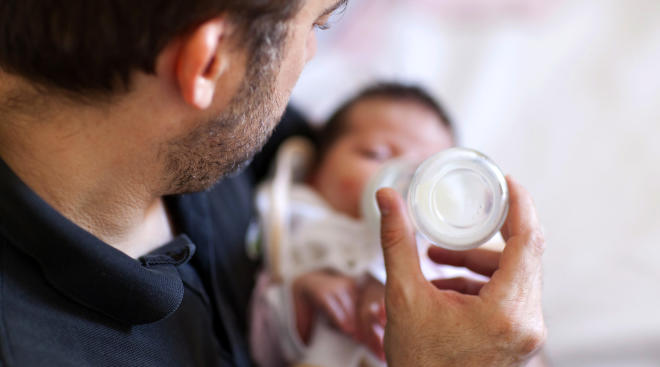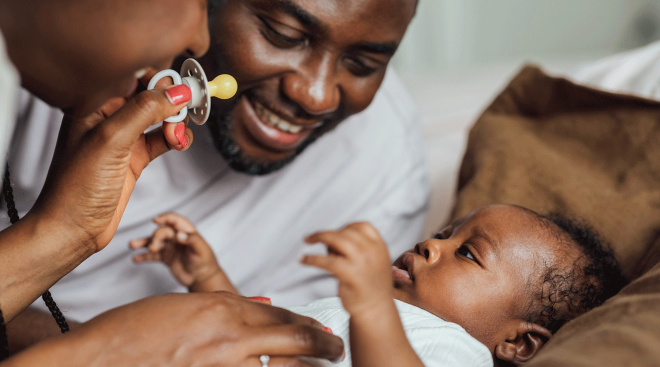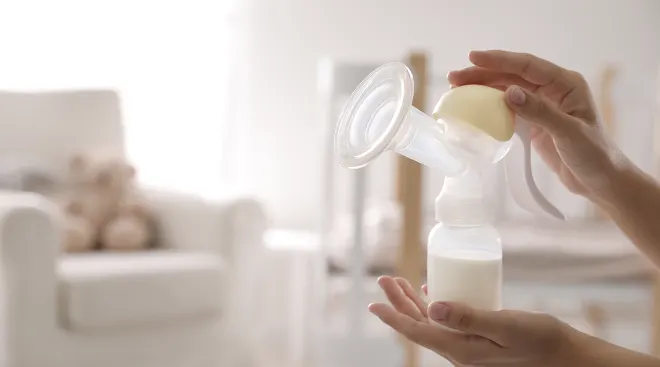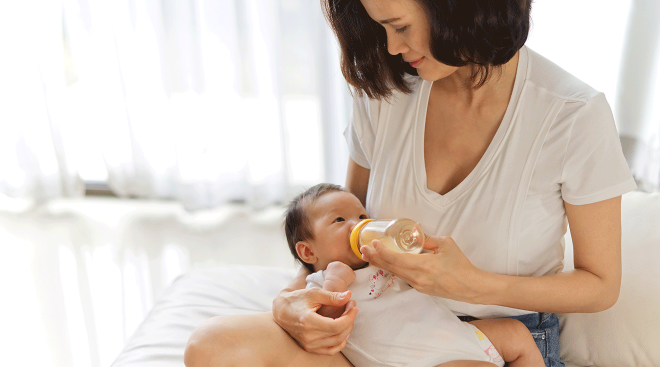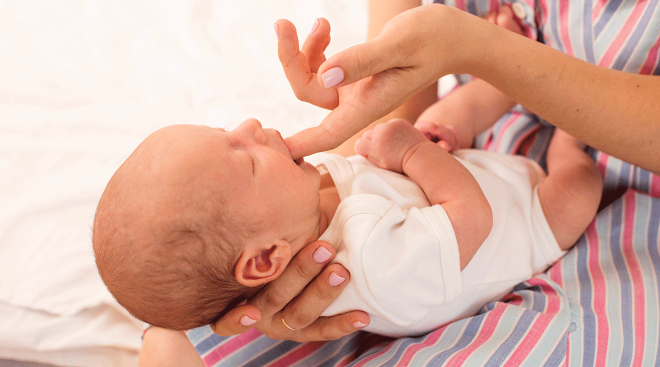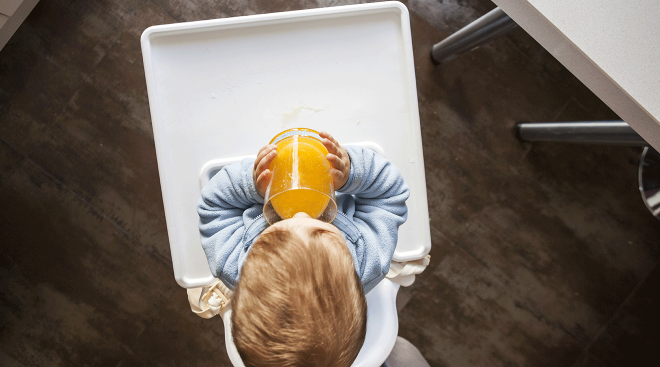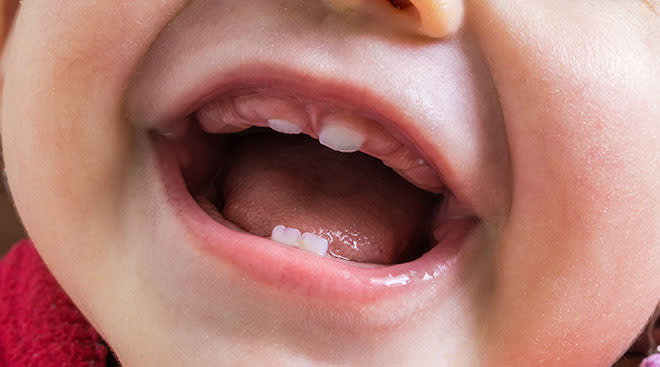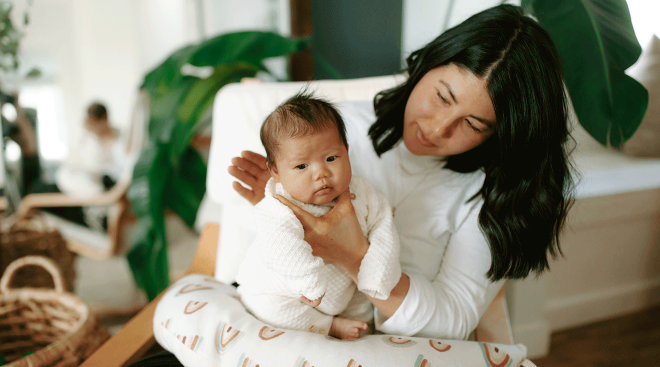Rooting Reflex in Babies: What It Is and Why It’s Important
It’s true that newborns can’t do much for themselves—but luckily, babies are born with certain innate reflexes that help support their growth and ensure their survival. Some newborn reflexes are ones you might have heard of, like the startle reflex, sucking reflex and grasp reflex. Infants are also born with what’s called the rooting reflex, which is crucial in helping them feed during those first few months. Keep reading to learn about the rooting reflex in babies, when it starts and how it supports baby’s development.
The rooting reflex serves as an early hunger cue and helps babies to instinctively feed during those early months of life. It’s basically an automatic muscle response to stimulation in or around their mouths, to help them find a breast (or bottle) nipple. “If you stroke the corner of baby’s mouth or nearby cheek, they’ll open their mouth and turn their head towards the side that you stroked,” says Jessica Madden, MD, IBCLC, a board-certified pediatrician and medical director of Aeroflow Breastpumps. As a result of this touch, baby should instinctively turn to latch on to a nipple to feed.
While physical touch is a strong stimulus for the rooting reflex, it’s not the only one. Smelling milk or simply being hungry could also cause baby to start rooting around in search of a breast or bottle, says Ashley Georgakopoulos, IBCLC, lactation director with Motif Medical. In fact, for breastfeeding parents, Madden encourages trying to latch baby every time they start rooting. Bottle-feeding parents should offer baby a bottle once they start rooting.
Sucking vs. rooting reflex in babies
The rooting reflex goes hand-in-hand with another of the newborn reflexes: sucking. They both help babies to feed. While the rooting reflex helps baby find the nipple, once it touches the roof of their mouth, the sucking reflex takes over to help them feed, Georgakopoulos explains.
The sucking reflex primarily develops during the third trimester, meaning premature babies might be born with a weak or absent sucking reflex, Madden says. “Pediatricians test for the sucking reflex by sticking a gloved finger into a baby’s mouth and lightly touching the roof of the mouth,” she explains. “Babies with an intact sucking reflex will immediately start to suck on the gloved finger.”
The rooting reflex is present in all full-term babies at birth. In fact, it develops while baby is still in utero, between weeks 28 and 30 of pregnancy, Georgakopoulos says. For premature babies, those born after 30 weeks will usually have a rooting reflex at birth, while those born before may not have developed it yet. “If a preemie is born before they have developed their rooting reflex, we will start to test for it around 30 weeks’ corrected age (or 10 weeks before their actual due date),” Madden says.
Wondering when the rooting reflex disappears? Both Madden and the American Academy of Pediatrics say it typically goes away after 4 months of age. Until then, Madden says she likes to check the rooting reflex at every well-visit for baby. “Testing for the rooting reflex is usually done so quickly during an exam that many parents probably don’t notice it’s being tested for.” (But once caregivers recognize it, they’ll see it all the time, she adds.) To perform that test, doctors simply stroke baby’s cheek or corner of their mouth.
Generally, the rooting reflex is pretty straightforward. But one potential cause for concern is the absence of the rooting reflex in newborns. Whether it’s absent on one side of baby’s face or both, it could signal a neurological or developmental problem. “If you notice that baby doesn’t have a rooting reflex, or that it’s only present on one side, you should contact baby’s pediatrician as soon as possible to discuss,” Madden says, adding that they may refer you to a pediatric neurologist for further evaluation.
“Depending on their age or development, baby may need help through feeding therapy,” Georgakopoulos adds. To help improve baby’s rooting reflex in these cases, your pediatrician may refer you to lactation consultants or a feeding therapist.
It’s also abnormal for baby to still have a rooting reflex past 4 months of age, Madden says, and this too should be flagged to your pediatrician. But whether a persistent rooting reflex points to developmental delays and disabilities isn’t agreed upon by experts. A 2022 review and study found that a persistent rooting reflex past the normal infant age may be a sign of conditions like congenital cerebral palsy and autism. However, Madden says there isn’t enough scientific evidence to prove a definitive relationship between the two. Plus, it’s important to remember that every baby is different and may lose their rooting reflex at a slightly different age.
The bottom line? If you’re ever concerned about your newborn’s rooting reflex in any way—or their eating habits—reach out to your pediatrician. They’re your best resource for ensuring baby’s healthy development.
Please note: The Bump and the materials and information it contains are not intended to, and do not constitute, medical or other health advice or diagnosis and should not be used as such. You should always consult with a qualified physician or health professional about your specific circumstances.
Plus, more from The Bump:
Ashley Georgakopoulos, IBCLC, has eight years of experience in lactation counseling and currently serves as the lactation director with Motif Medical. She received her bachelor’s degree in nutrition sciences from the University of Tennessee-Knoxville.
Jessica Madden, MD, IBCLC, is a board-certified pediatrician, lactation consultant and neonatologist at Rainbow Babies and Children’s Hospital in Cleveland, Ohio. She also currently serves as the medical director of Aeroflow Breastpumps, as well as the founder of Primrose Newborn Care. Previously, she has served as the clinical instructor of pediatrics at Harvard Medical School. She received her bachelor’s degree from the University of Notre Dame and her medical degree from Ohio State University. She completed her residency in pediatrics at the University of Massachusetts.
American Academy of Pediatrics, [Newborn Reflexes(https://www.healthychildren.org/English/ages-stages/baby/Pages/Newborn-Reflexes.aspx),,) March 2022
Stat Pearls, Rooting Reflex, April 2023
Frontiers in Neurology, Retained Primitive Reflexes and Potential for Intervention in Autistic Spectrum Disorders, July 2022
Learn how we ensure the accuracy of our content through our editorial and medical review process.
Navigate forward to interact with the calendar and select a date. Press the question mark key to get the keyboard shortcuts for changing dates.






































